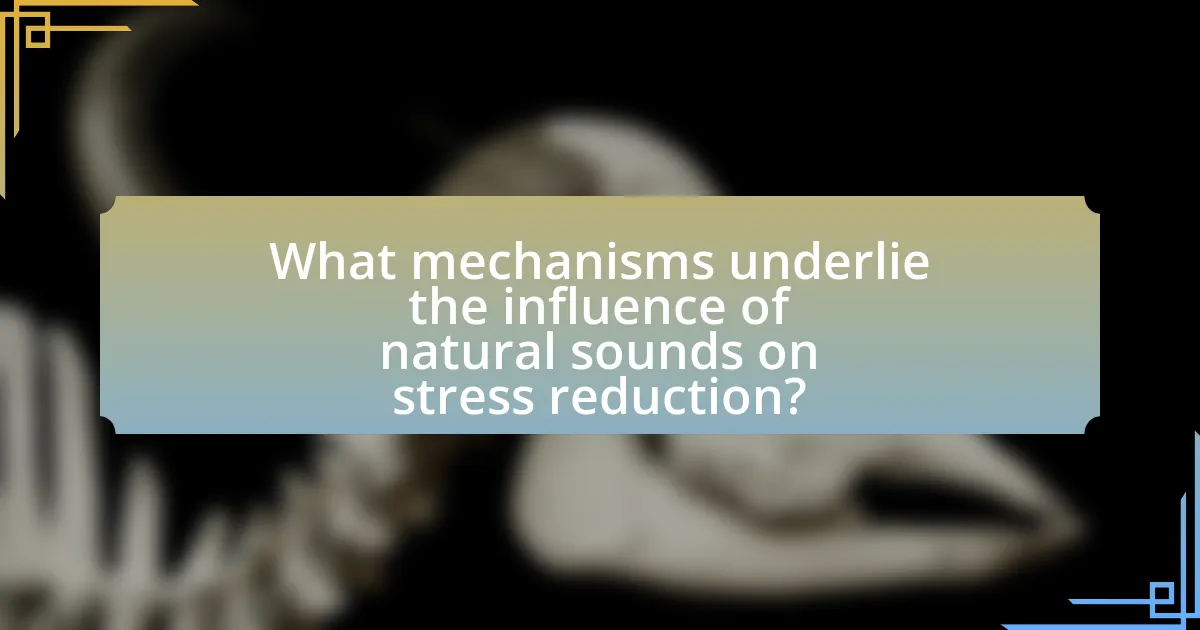The article examines the influence of natural sounds on stress reduction, highlighting their role in promoting relaxation and lowering cortisol levels. Research indicates that exposure to sounds such as flowing water and birdsong can enhance mood and decrease physiological stress responses. Key studies demonstrate that natural soundscapes contribute to improved mental well-being, reduced anxiety, and overall stress management, particularly in tranquil environments. The article also explores the physiological effects of stress on the body, the mechanisms through which natural sounds affect mental health, and practical methods for incorporating these sounds into daily life for enhanced well-being.

What is the Influence of Natural Sounds on Stress Reduction?
Natural sounds significantly influence stress reduction by promoting relaxation and lowering cortisol levels. Research indicates that exposure to natural sounds, such as flowing water or birdsong, can enhance mood and decrease physiological stress responses. A study published in the journal “Environmental Science & Technology” by Bratman et al. (2015) found that participants who walked in nature and listened to natural sounds reported lower levels of rumination and stress compared to those in urban environments. Additionally, a meta-analysis in “Psychological Bulletin” by Kahn et al. (2018) confirmed that natural soundscapes contribute to improved mental well-being and reduced anxiety. These findings underscore the beneficial role of natural sounds in stress management.
How do natural sounds impact our mental health?
Natural sounds positively impact mental health by reducing stress and promoting relaxation. Research indicates that exposure to natural sounds, such as birdsong or flowing water, can lower cortisol levels, which are associated with stress. A study published in the journal “Environmental Psychology” by authors Bratman, Anderson, et al. found that participants who listened to natural sounds reported lower levels of anxiety and improved mood compared to those in urban environments with artificial noise. This evidence supports the conclusion that natural sounds can enhance mental well-being by fostering a calming atmosphere and reducing psychological distress.
What types of natural sounds are most effective for stress relief?
Natural sounds such as ocean waves, rain, and birdsong are most effective for stress relief. Research indicates that these sounds can lower cortisol levels, which is a hormone associated with stress. For instance, a study published in the Journal of Environmental Psychology found that participants exposed to natural sounds reported lower stress levels and improved mood compared to those in silence or exposed to urban noise. Additionally, the rhythmic patterns of these sounds can promote relaxation and enhance focus, further contributing to their effectiveness in stress reduction.
How do different environments influence the effectiveness of natural sounds?
Different environments significantly influence the effectiveness of natural sounds in promoting stress reduction. For instance, natural sounds such as flowing water or birdsong are more effective in tranquil settings like parks or forests, where they can enhance feelings of relaxation and well-being. Research indicates that exposure to natural sounds in these environments can lower cortisol levels, a stress hormone, and improve mood. Conversely, in urban settings with high noise pollution, the same natural sounds may be less effective due to competing auditory distractions, which can diminish their calming effects. Studies have shown that individuals in quieter, natural environments report greater reductions in stress and anxiety when exposed to natural sounds compared to those in noisy, urban environments.
Why is stress reduction important for overall well-being?
Stress reduction is crucial for overall well-being because it directly impacts physical health, mental clarity, and emotional stability. Chronic stress can lead to serious health issues such as cardiovascular disease, obesity, and weakened immune function, as evidenced by research from the American Psychological Association, which highlights that prolonged stress can increase the risk of these conditions. Furthermore, reducing stress enhances cognitive function and emotional resilience, allowing individuals to cope better with challenges and maintain healthier relationships. Studies indicate that effective stress management techniques, including exposure to natural sounds, can significantly lower cortisol levels, thereby promoting a sense of calm and improving overall life satisfaction.
What are the physiological effects of stress on the body?
Stress triggers a range of physiological effects on the body, primarily through the activation of the hypothalamic-pituitary-adrenal (HPA) axis, leading to increased production of cortisol and adrenaline. Elevated cortisol levels can result in heightened blood pressure, increased heart rate, and altered immune function, making the body more susceptible to illness. Additionally, stress can cause muscle tension, digestive issues, and changes in sleep patterns, which further exacerbate physical health problems. Research indicates that chronic stress is linked to conditions such as cardiovascular disease, obesity, and diabetes, highlighting the significant impact of stress on overall health.
How can natural sounds contribute to better mental health outcomes?
Natural sounds can significantly enhance mental health outcomes by reducing stress and promoting relaxation. Research indicates that exposure to natural sounds, such as birdsong or flowing water, activates the parasympathetic nervous system, which helps lower cortisol levels, a hormone associated with stress. A study published in the journal “Environmental Psychology” by authors like Bratman et al. (2015) found that individuals who spent time in natural environments with natural sounds reported lower levels of anxiety and improved mood compared to those in urban settings. This evidence supports the idea that integrating natural sounds into daily life can lead to better mental health by fostering a calming atmosphere and reducing psychological distress.

What mechanisms underlie the influence of natural sounds on stress reduction?
Natural sounds influence stress reduction primarily through their ability to activate the parasympathetic nervous system, which promotes relaxation and reduces physiological stress responses. Research indicates that exposure to natural sounds, such as flowing water or birdsong, can lower cortisol levels, decrease heart rate, and enhance feelings of well-being. A study by Bratman et al. (2015) published in the Proceedings of the National Academy of Sciences found that participants who walked in nature and were exposed to natural sounds reported lower levels of rumination and improved mood compared to those in urban environments. This evidence supports the notion that natural sounds facilitate a calming effect, contributing to overall stress reduction.
How do natural sounds affect the brain’s response to stress?
Natural sounds significantly reduce the brain’s response to stress by activating the parasympathetic nervous system, which promotes relaxation. Research indicates that exposure to natural sounds, such as flowing water or birdsong, can lower cortisol levels, a hormone associated with stress. A study published in the journal “Environmental Science & Technology” by Bratman et al. (2015) found that participants who walked in nature while listening to natural sounds reported lower levels of rumination and stress compared to those in urban environments. This evidence supports the conclusion that natural sounds play a crucial role in mitigating stress responses in the brain.
What role do neurotransmitters play in the stress-reducing effects of natural sounds?
Neurotransmitters play a crucial role in mediating the stress-reducing effects of natural sounds by influencing emotional and physiological responses. Specifically, exposure to natural sounds has been shown to increase levels of neurotransmitters such as serotonin and dopamine, which are associated with mood regulation and feelings of well-being. Research indicates that these neurotransmitters help lower cortisol levels, the hormone primarily responsible for stress, thereby promoting relaxation and reducing anxiety. For instance, a study published in the journal “Environmental Psychology” found that participants exposed to natural sounds exhibited significant reductions in stress markers, correlating with increased serotonin activity.
How does the body physically respond to listening to natural sounds?
Listening to natural sounds triggers a physiological response in the body that promotes relaxation and reduces stress. This response includes a decrease in heart rate, lower blood pressure, and reduced levels of the stress hormone cortisol. Research indicates that exposure to natural sounds can activate the parasympathetic nervous system, which is responsible for the body’s rest-and-digest functions. A study published in the journal “Environmental Psychology” by Bratman et al. (2015) found that participants who listened to natural sounds reported lower levels of anxiety and improved mood, supporting the idea that these sounds can facilitate a calming effect on the body.
What scientific studies support the benefits of natural sounds for stress reduction?
Scientific studies demonstrate that natural sounds significantly reduce stress levels. For instance, a study published in the journal “Environmental Science & Technology” by Bratman et al. (2015) found that participants who walked in nature and were exposed to natural sounds reported lower levels of rumination and stress compared to those who walked in urban environments. Additionally, research by Alvarsson et al. (2010) in “International Journal of Environmental Research and Public Health” indicated that listening to natural sounds, such as birdsong and flowing water, can lower physiological stress markers, including cortisol levels. These studies provide concrete evidence that natural sounds play a beneficial role in stress reduction.
What methodologies are used in research on natural sounds and stress relief?
Research on natural sounds and stress relief employs methodologies such as experimental studies, surveys, and physiological measurements. Experimental studies often involve controlled environments where participants are exposed to various natural soundscapes while their stress levels are assessed through self-reported questionnaires and physiological indicators like heart rate variability. Surveys collect subjective data on individuals’ experiences with natural sounds and their perceived effects on stress relief. Physiological measurements, including cortisol levels and brain imaging techniques, provide objective evidence of the impact of natural sounds on stress reduction. For instance, a study published in the Journal of Environmental Psychology demonstrated that participants exposed to natural sounds exhibited lower cortisol levels compared to those in silent or urban sound environments, validating the effectiveness of these methodologies in understanding the relationship between natural sounds and stress relief.
What are the key findings from recent studies on this topic?
Recent studies indicate that natural sounds significantly reduce stress levels in individuals. Research published in the journal “Health Psychology” by authors Bratman, Anderson, et al. (2015) found that exposure to natural auditory environments, such as birdsong and flowing water, leads to lower cortisol levels, a key stress hormone. Additionally, a study in “Environmental Science & Technology” by Alvarsson, Nilsson, and Haga (2010) demonstrated that participants exposed to natural sounds reported decreased anxiety and improved mood compared to those in urban soundscapes. These findings collectively underscore the therapeutic potential of natural sounds in stress management and mental well-being.

How can individuals incorporate natural sounds into their daily lives for stress reduction?
Individuals can incorporate natural sounds into their daily lives for stress reduction by actively listening to recordings of nature, such as birdsong, ocean waves, or rain. Research indicates that exposure to natural sounds can lower cortisol levels, which are associated with stress. For instance, a study published in the journal “Environmental Psychology” found that participants who listened to natural sounds reported lower stress levels and improved mood compared to those who listened to urban noise. Additionally, individuals can create a calming environment by using sound machines or apps that feature natural soundscapes, integrating these sounds into daily routines like meditation, yoga, or even while working. This consistent exposure can enhance relaxation and promote a sense of well-being.
What practical methods can be used to access natural sounds?
Practical methods to access natural sounds include using mobile applications designed for soundscapes, visiting natural parks or reserves, and utilizing online platforms that stream nature sounds. Mobile applications like “Calm” and “Rain Rain” provide curated soundscapes that mimic natural environments, allowing users to experience sounds such as rain, ocean waves, or forest ambiance. Visiting natural parks or reserves offers direct exposure to authentic natural sounds, which has been shown to reduce stress levels, as evidenced by studies indicating that immersion in nature can lower cortisol levels. Online platforms like YouTube and dedicated websites offer a variety of recordings of natural environments, making it easy for individuals to access these sounds from home.
How can technology enhance the experience of listening to natural sounds?
Technology can enhance the experience of listening to natural sounds by utilizing high-fidelity audio equipment and immersive soundscapes. High-quality speakers and headphones can reproduce the nuances of natural sounds, such as the rustling of leaves or flowing water, providing a more authentic auditory experience. Additionally, applications and devices that create 3D audio environments allow listeners to feel as if they are physically present in nature, which can amplify the calming effects of these sounds. Research indicates that exposure to natural sounds can significantly reduce stress levels, with studies showing a 61% decrease in stress indicators when individuals listen to nature sounds compared to urban noise.
What are some recommended natural soundscapes for stress relief?
Recommended natural soundscapes for stress relief include ocean waves, rainforest sounds, and gentle rain. Ocean waves have been shown to promote relaxation and reduce anxiety, as their rhythmic patterns mimic the body’s natural rhythms. Rainforest sounds, rich in diverse wildlife and flowing water, create a calming atmosphere that can enhance mood and lower stress levels. Gentle rain sounds are often associated with tranquility and can help mask disruptive noises, further aiding in relaxation. Studies indicate that exposure to these natural soundscapes can lead to measurable reductions in stress hormones, supporting their effectiveness in stress relief.
What tips can help maximize the benefits of natural sounds for stress reduction?
To maximize the benefits of natural sounds for stress reduction, individuals should engage in active listening and create a conducive environment. Active listening involves focusing entirely on the sounds, such as birds chirping or water flowing, which can enhance relaxation and mindfulness. Creating a conducive environment includes minimizing distractions, such as turning off electronic devices, and using high-quality speakers or headphones to ensure clarity of the natural sounds. Research indicates that exposure to natural sounds can lower cortisol levels, a hormone associated with stress, thereby reinforcing the effectiveness of these practices.
How can one create a calming environment using natural sounds?
One can create a calming environment using natural sounds by incorporating elements such as recordings of ocean waves, birdsong, or rustling leaves into their space. These natural sounds have been shown to reduce stress and promote relaxation, as evidenced by research indicating that exposure to nature sounds can lower cortisol levels and enhance mood. For instance, a study published in the journal “Environmental Psychology” found that participants exposed to natural soundscapes reported significantly lower stress levels compared to those in silent or urban sound environments. By strategically using these sounds in daily life, individuals can foster a serene atmosphere conducive to mental well-being.
What routines can be established to regularly incorporate natural sounds into daily life?
To regularly incorporate natural sounds into daily life, individuals can establish routines such as morning walks in nature, listening to nature soundtracks during work or relaxation, and creating a designated quiet space for meditation with natural soundscapes. Research indicates that exposure to natural sounds, like birdsong or flowing water, can significantly reduce stress levels and enhance overall well-being. For example, a study published in the journal “Environmental Psychology” found that participants who listened to natural sounds reported lower stress and improved mood compared to those in silent environments.





